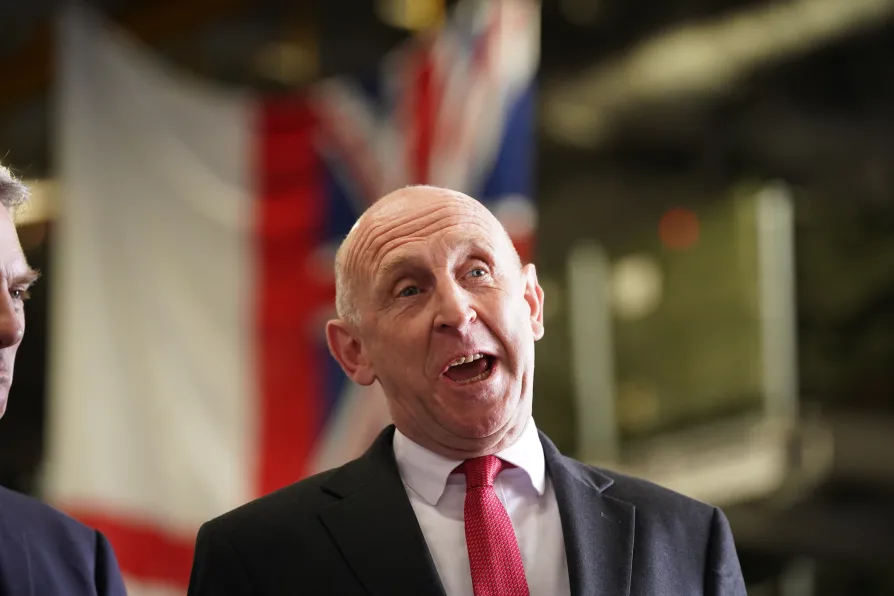
 Defence Secretary John Healey during a visit to the HMS Prince of Wales aircraft carrier during the Talisman Sabre 2025 Closing Ceremony in Darwin, Australia, July 27, 2025
Defence Secretary John Healey during a visit to the HMS Prince of Wales aircraft carrier during the Talisman Sabre 2025 Closing Ceremony in Darwin, Australia, July 27, 2025
“WW3 fears explode as Britain vows to fight China over Taiwan,” a breathless headline in the Express informs us.
The tabloid press is known for sensationalism. But this story we should take seriously.
Defence Secretary John Healey’s suggestion that Britain is readying for war in the Pacific was delivered from the HMS Prince of Wales, an aircraft carrier preparing for the biggest war games ever hosted by Australia, Operation Talisman Sabre 2025. The ship will “likely operate near Taiwan” as it sails from Australia to Japan, the UK Defence Journal briefs, as part of wider US-led exercises.
British troops will be engaged in provocative manoeuvres viewed by Beijing as part of Washington’s bid to encircle it militarily. That is itself part of a wider US strategy to derail China’s rise.
Because China is the US’s only “peer competitor” (the Pentagon’s words) and their rivalry is global, this is the factor in international politics most likely to lead to another world war. And Washington is the aggressor: it is not China seeking to stop other countries trading with the US, or dispatching warships to patrol the American (or British) coasts.
A serving US air force commander, General Mike Minihan, said two years ago that a US-China war would erupt this year, 2025. The risk is real.
This context is crucial when we consider Healey’s sabre-rattling. The propaganda version is that Britain is concerned to defend Taiwan from Chinese aggression, but that isn’t true.
Taiwan’s status is the first contradiction. It is universally recognised as part of China diplomatically. All countries that recognise the People’s Republic of China, including Britain and the United States, recognise its sovereignty over the island of Taiwan; those which recognise the Taiwanese government do so on the basis that it is the Republic of China, heir to the pre-1949 Chinese regime driven off the mainland by communist revolution. Why is Healey threatening war with China over territory Britain recognises as Chinese?
For some, diplomatic formalities are less important than support for the Taiwanese people’s supposed desire for independence.
This underrates the extent to which Taiwan is being used as a pawn by the US, and paints a misleading picture of the island as a plucky democracy united in fear of its communist neighbour.
The recent — failed — bid by Taiwanese president Lai Ching-te to force the removal of 24 opposition MPs as “pro-China” voices, intended to end the opposition’s control of parliament, shows a more complex reality.
The opposition Kuomintang — the party that ruled China before 1949 — is not pro-communist, but enjoys the support of the huge section of Taiwanese society which regards friendly relations with the mainland as preferable to a conflict being whipped up in Washington’s interests.
Since Beijing sees reunification as part of the decolonisation of China, with Taiwan having been seized by Japan during the “century of humiliation” and returned to China in 1945, it opposes Taiwanese independence: but so do millions on Taiwan, and Lai’s attempt to make identification with China suspect is bitterly contested.
Beijing has in any case pursued a peaceful unification strategy based on cross-strait economic integration, which is far advanced despite a recent push by Taipei to restrict activity by mainland companies and deter Taiwanese from flocking to the mainland for work and study.
The US has long funded Taiwanese separatist and anti-communist projects, from the Taiwan Foundation for Democracy to Taiwan-based agencies focused on undermining mainland Chinese authorities such as the China Dissent Monitor.
Conflict over Taiwan is only likely if provoked by a US-backed bid to change the status quo: and nobody should imagine Washington’s motivation would be to protect the people of the island. The whole point would be to provoke China, and war.
That is the overarching war game in which Operation Talisman Sabre takes place. Britain should have no part in it.










